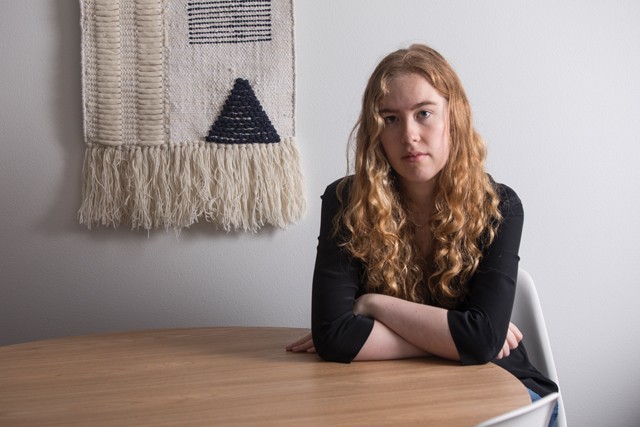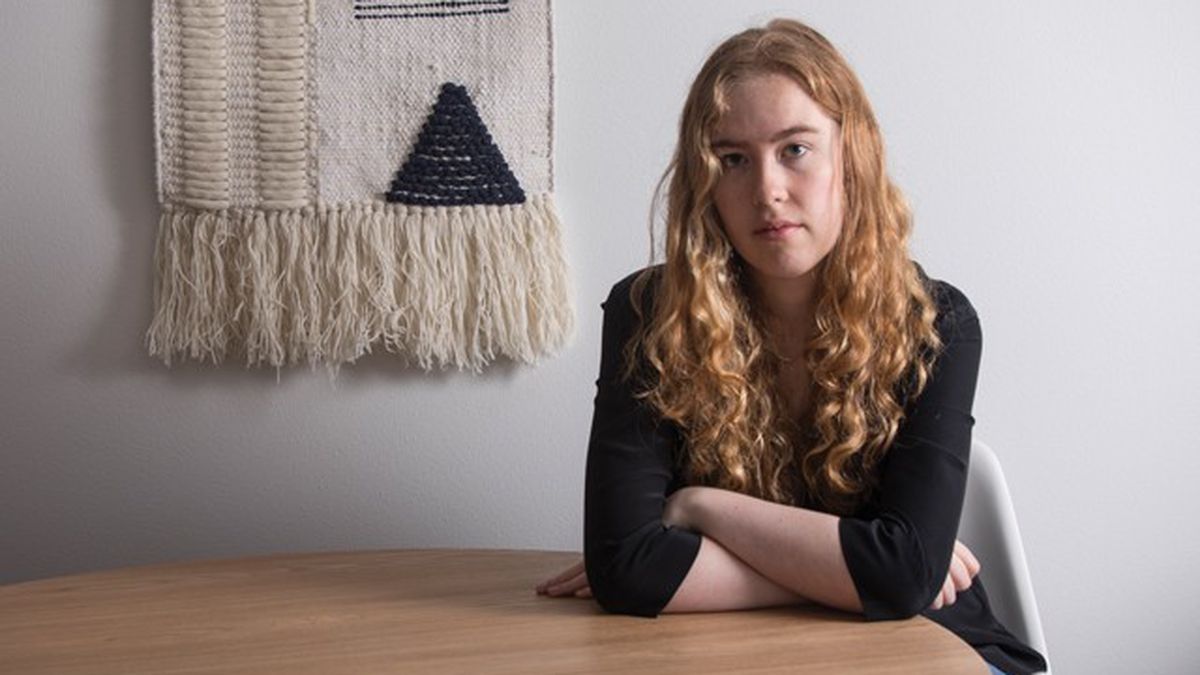
In 2015, Mills College student Kendall Anderson went public with a harrowing account of what happened when she reported to the Oakland Police Department that she had been raped. She wrote that the investigator assigned to her case, Officer Bryant Ocampo, didn’t call her for a month, and when he did finally arrange an interview, he questioned her about what she was wearing and whether she was a virgin. At one point, he even suggested that she should call her attacker and tell him she was pregnant.
After her story was published, she met with then-police Chief Sean Whent, and the department made reforms in the way it conducts victim interviews. Despite the flaws in the investigation, OPD eventually referred her case to the Alameda County District Attorney’s Office, which then declined to prosecute her alleged attacker. But OPD still recorded the case as a rape in official department statistics and to the FBI for its Universal Crime Reports, or UCR, program.
Although Anderson’s case was considered to be “founded,” that is, an actual rape, the story of how OPD botched her case illustrates the ways in which law enforcement agencies can mishandle and misidentify sexual assaults.
According to FBI data, East Bay law enforcement agencies have determined that hundreds of rape reports they’ve received in the past four years were “unfounded,” that is, they were determined by investigators to be false or baseless. Experts say a high rate of unfounded cases can be an indicator of poor investigatory practices. An analysis published last year by the nonprofit open government advocacy group the Sunlight Foundation found that three East Bay police departments—Concord, Berkeley, and Oakland—have some of the highest rates of unfounded rape cases in the country. The high rates raise concerns that these agencies have done a poor job investigating sexual assaults.
In Concord, police determined that nearly half of all reported rapes from 2013 to 2016 were unfounded, a total of 91 reports, according to FBI data. In Berkeley, police concluded that 104 cases were unfounded, including 53.3 percent of the reported rapes in 2014. In Oakland, police determined that 260 reports of rape were unfounded in that period, though the rate has declined since the department implemented reforms: 11.2 percent in 2016, down from more than a third in 2014. By contrast, statewide, law enforcement agencies determined that only 4 to 6 percent of rape reports were unfounded over the same period, according to FBI data.
As with Anderson’s case, many things can go wrong with sexual assault investigations. According to Rebecca Campbell, a professor of psychology at Michigan State University, research has shown that 80 to 90 percent of sexual assault cases reported to police are either not referred for prosecution or not charged. In a 2012 presentation to the National Institute of Justice, “The Neurobiology of Sexual Assault,” Campbell identifies misunderstanding among police investigators of the impacts of trauma and its effects on behavior and memory as a major cause of case attrition.
She also found that police investigators regularly disbelieve victims, finding their stories nonsensical or inconsistent. Investigators might ask questions about the victims clothing, their sexual history, or interrogate them about why they didn’t fight back harder. This misunderstands common psychological reactions to trauma, Campbell said, like that some victims freeze during an assault and find themselves unable to move at all or that memories of traumatic events become fragmented and difficult to recall in a coherent way.
Officials with all three East Bay police departments disputed the idea that their investigations weren’t thorough and sensitive to victims. But because police do not report unfounded cases in official crime statistics, if police concluded in error that a significant number of cases were unfounded, it could mean that these departments have been underreporting the number of rapes in their cities for years.
Concord police Lt. Mike Kindorf said he was surprised to find out that Concord’s rate of unfounded rape reports was so much higher than statewide. He said one reason might be that the department later determined that some reports of rape fit a more appropriate crime classification and the department meticulously recorded this.
“A lot of folks just don’t have the time to do that,” Kindorf said. “We try and have pretty accurate statistics and change those when appropriate.”
Another possibility was that reports of rape that came into the regional hospital in Concord, John Muir Medical Center, might be referred to the Concord police when the assaults actually happened in other jurisdictions. “We don’t look for reasons to downgrade cases; we think our reports to the [UCR] are very accurate,” Kindorf said.
Capt. Ed Spiller, head of the criminal investigations division in Berkeley, said he is taking a close look at the unfounded cases to determine if the department’s reporting practices are in line with UCR guidelines. He said he has been looking at the department’s data going back to 2004, and found that Berkeley’s unfounded rate went up drastically in 2011 after the department started using a new computer system.
Some of the cases he has reviewed are reports received from teachers or nurses, people who are mandated by law to report when they’re told about a possible rape, but the victims have been uncooperative, he said. Such cases would then be classified as suspicious circumstances in the department’s statistics. Spiller said he is seeking clarification from the Department of Justice as to whether this would meet the criteria for an unfounded report.
“We certainly try to investigate all sexual assaults in the fullest,” Spiller said. “We obviously are going to review these cases listed as unfounded to make sure we’re doing the right thing.”
A recent change in the definition of rape for FBI reporting also complicates record keeping. The FBI’s new definition no longer requires that assailants must use “force” for a sexual assault to be classified as rape.
The new definition took effect in 2013, but some departments didn’t start using it until 2015. According to a department report, Berkeley started using the revised definition in 2014, leading to a jump in its rape cases that year.
While Oakland appears to have been using the revised definition in its reports to the FBI starting in 2015, it has not been using it for the regular crime reports posted on its website. According to the FBI, Oakland had 289 rape cases in 2015 and 277 in 2016. But according to the statistics released by Oakland’s Crime Analysis Unit, the department had only 213 cases in 2015 and 191 cases in 2016.
But even the FBI figures could be low. The head of Oakland’s Special Victims Unit, Lt. Jill Encinias, said the department incorrectly reported some cases to be unfounded to the FBI. She said that OPD investigators have 19 different options for how to close their cases, but there are only six options for FBI reporting. “Now that that’s been realized, they’re going to make sure that’s corrected,” Encinias said.
Encinias has been in charge of sexual assault investigations for years, including when Anderson reported being raped in her dorm room at Mills in 2013. In a complaint to the Citizens Police Review Board, Anderson said she found Encinias to be unresponsive to her complaints about how her investigation was handled, telling her that Ocampo could “come off as a jerk sometimes” but meant well and suggested that Anderson “seek counseling.”
Encinias acknowledged that the department made reforms in the way it handles sexual assault cases since Anderson’s case became public, including having a “soft room” for interviews that doesn’t have handcuffs on the chairs. All interviews are videotaped and monitored to make sure they are handled appropriately, she said. “Everything we do is victim-centered and trauma-centered,” Encinias said. “The victim comes first in all of our cases.”
However, the department came under fire last year for its investigation into the exploitation of a woman who went by the name of Celeste Guap by several officers. A report by court-appointed investigator Edward Swanson released last year described an interview with Guap that made many of the same mistakes common to sexual assault investigations. Investigators suggested she was lying, blamed her for the suicide of Officer Brendan O’Brien, and watched as she destroyed evidence by deleting her text messages. Eventually, criminal charges were dismissed against several OPD officers because of a lack of evidence.
In a recent interview, Anderson said she was distressed but not surprised by the Guap scandal.
“It is troubling that the culture of sexism and abuse within the OPD is widespread enough that it involved the officers themselves committing sex crimes,” Anderson said. “However, the Celeste Guap case also shows just how pervasive this is within the department. As the public consciousness shifts and more and more people come forward with stories of abuse, it is important that we take cases like this seriously and address the underlying factors that cause them to happen in the first place.”
This report was originally published by our sister publication, Oakland Magazine.














